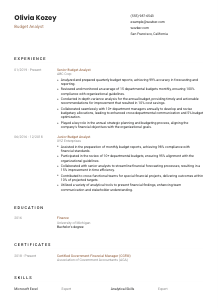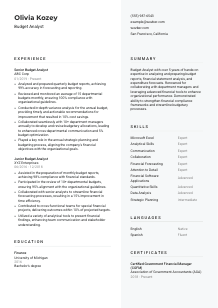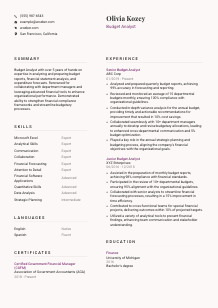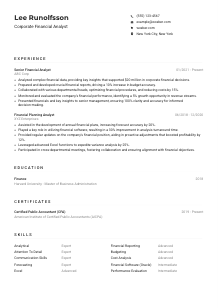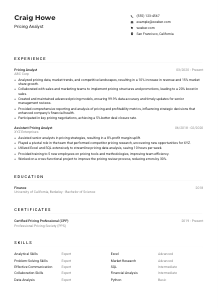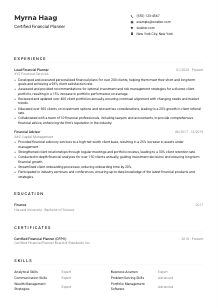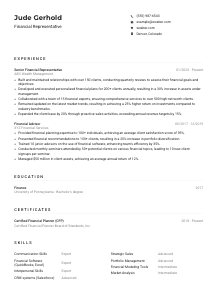Budget Analyst CV Example
Balancing spreadsheets, but your CV doesn't add up? Explore this Budget Analyst CV example, calculated with Wozber free CV builder. Discover how you can showcase your fiscal expertise to align with job criteria, setting your career on a financial trajectory that's always in the black!
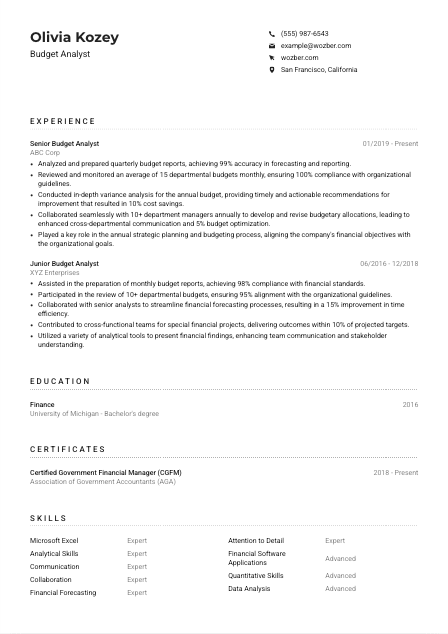
How to write a Budget Analyst CV?
Ready to elevate your Budget Analyst application and ensure it resonates with the heart of your desired role? Within the complex world of finance, your CV is not just a document—it's a testament to your analytical finesse and your capability to forecast financial narratives. Leveraging the power of Wozber, a free CV builder, this guide will walk you through crafting an ATS-compliant CV bespoke to the Budget Analyst position. Let's embark on this journey, transforming your CV into an impactful narrative that lands you the role of your dreams!
Personal Details
The way you introduce yourself on your CV can set the tone for everything that follows. Your Personal Details section is akin to the cover of your financial ledger; it needs to be accurate, professional, and aligned with your target role. Here's how you can craft it perfectly for the Budget Analyst position:
1. Emphasize Your Name
Think of your name as your brand. Use a clear, professional font and size that makes it stand out at the top of your CV. Remember, first impressions count, and your name is the very first piece of information a hiring manager will see.
2. Job Title Precision
Aligning with the job title right beneath your name sets a focal point. For instance, positioning "Budget Analyst" clearly under your name immediately signals your desired role to the hiring manager, syncing your application with the job on offer.
3. Essential Contact Details
Keep your contact information straightforward: include your most accessible phone number and a professional email address – preferably one that uses your first and last name. This simplicity ensures the hiring manager can easily reach out to you.
4. Location Matters
"Must be located in or willing to relocate to San Francisco, CA." Given this requirement, stating "San Francisco, California" in your CV confirms your eligibility regarding location, clearing any doubts about relocation right off the bat.
5. A Nod to Professional Online Presence
If you have a LinkedIn profile or a personal website that showcases your professional portfolio, including it can bolster your credibility. Make sure they're polished and echo the narrative of your CV.
Takeaway
Your Personal Details are the handshake before the conversation starts. Neat, precise, and targeted—they set the stage for making a stellar first impression. Think of this section as your business card within the CV, presenting essential information about you with professional elegance. Focus on aligning this section with the specifics of the Budget Analyst role. You're now one step closer to that interview call!





Experience
In the role of a Budget Analyst, showcasing a trail of financial scrutiny and strategic budgeting prowess is key. Let's delve into how you can articulate your experience to demonstrate not just your qualification but your distinction in the financial domain.
- Analyzed and prepared quarterly budget reports, achieving 99% accuracy in forecasting and reporting.
- Reviewed and monitored an average of 15 departmental budgets monthly, ensuring 100% compliance with organisational guidelines.
- Conducted in‑depth variance analysis for the annual budget, providing timely and actionable recommendations for improvement that resulted in 10% cost savings.
- Collaborated seamlessly with 10+ department managers annually to develop and revise budgetary allocations, leading to enhanced cross‑departmental communication and 5% budget optimisation.
- Played a key role in the annual strategic planning and budgeting process, aligning the company's financial objectives with the organisational goals.
- Assisted in the preparation of monthly budget reports, achieving 98% compliance with financial standards.
- Participated in the review of 10+ departmental budgets, ensuring 95% alignment with the organisational guidelines.
- Collaborated with senior analysts to streamline financial forecasting processes, resulting in a 15% improvement in time efficiency.
- Contributed to cross‑functional teams for special financial projects, delivering outcomes within 10% of projected targets.
- Utilized a variety of analytical tools to present financial findings, enhancing team communication and stakeholder understanding.
1. Align with Job Requirements
Begin by dissecting the provided job description, like "Review and monitor departmental budgets, ensuring compliance with organisational guidelines." Match your past roles and responsibilities with these requirements, showcasing your direct experience and acumen in these areas.
2. Role Hierarchy and Company Context
Structure your experiences starting with the most recent one. For each role, list your job title, company name, and dates of employment. Establishing a chronological structure allows the hiring manager to follow your professional growth seamlessly.
3. Harnessing Accomplishment Statements
For each position, aim to craft bullet points that mirror the job's needs, such as preparing budget reports or conducting financial variance analyses. Quantify achievements when possible with metrics, like "resulted in 10% cost savings," to communicate your impact.
4. The Impact of Quantification
Including numbers catches the eye and gives a tangible measure of your accomplishments. Whether it's the percentage of budget you saved, the number of budget reports you've churned, or the size of the budgets you have overseen, numerical achievements underscore your effectiveness.
5. Relevance Is Key
Sift through your experiences and highlight those most relevant to a Budget Analyst role. Prioritize experiences that demonstrate your financial analysis, budget planning, and strategic allocation skills, making it easier for hiring managers to spot your suitability.
Takeaway
The Experience section is where you get to tell your professional story. It's an opportunity to showcase your journey through the financial landscape, highlighting moments where you've shone as a Budget Analyst. By tailoring your experiences to the job requirements and quantifying your achievements, you construct a narrative that not only demonstrates your qualifications but also your potential to excel in your new role. Aim to impress, and let your professional story shine.
Education
While your experience may demonstrate your expertise, your education lays down the foundational knowledge essential for a Budget Analyst. We'll navigate how to highlight your educational background in a way that resonates with the demands of the position.
1. Highlighting Necessary Education
Confirm your qualification against the job's requirements. Listing your "Bachelor's degree in Finance, Accounting, or a related field" exactly as requested directly aligns your academic background with the job prerequisites.
2. Clear Structure
Organize your education section by listing your degree, the field of study, the institution, and your graduation year. Keeping this information clear and straightforward allows for an immediate understanding of your academic qualifications.
3. Degree Specificity
In cases where the job asks for a specific field of study, such as finance or accounting, ensure your degree is listed verbatim if you hold it. This direct match can significantly boost your CV's ATS ranking.
4. The Value of Relevant Courses
For recent graduates or those with fewer years of experience, listing relevant courses can add depth to your educational segment. Though not strictly necessary for more seasoned professionals, this can showcase specialized knowledge or interests in the budgeting field.
5. Educational Honors and Activities
Including any honors, such as cum laude distinctions, or involvement in relevant organisations, like finance clubs or fraternities, can provide a rounded view of your commitment and activity within your field during your academic career.
Takeaway
Your education is a testament to your dedication and foundational expertise in finance and budgeting. By ensuring it echoes the job's educational requirements, you solidify your standing as a well-qualified candidate. Each educational detail you list is an extra layer of proof of your readiness and suitability for the Budget Analyst role. Let your education section serve as the bedrock of your professional potential.
Certificates
In the ever-evolving landscape of finance, staying updated and certified can set you apart as a Budget Analyst. Let's explore how to present your certifications in a way that underscores your dedication to continuous learning and professional development.
1. Recognize Relevant Certifications
Even though the job description might not specify it, having certifications such as the "Certified Government Financial Manager (CGFM)" directly relates to the job's context and showcases an added layer of qualification and specialization.
2. Quality Over Quantity
Focus on listing certifications that directly enhance your candidacy for the Budget Analyst role. Carefully choose those that demonstrate expertise in budgeting, financial analysis, or financial management, ensuring you highlight the most impactful ones first.
3. Dates Matter
Providing the date of certification, especially if it's a recent achievement, underscores your commitment to staying current in your field. This temporal marker can also help your CV pass through in scenarios where currency of knowledge is crucial.
4. Commit to Continual Learning
The finance field is dynamic, with new practices, regulations, and technologies constantly emerging. Highlighting your ongoing education and certification pursuits illustrates your initiative to remain at the forefront of your profession.
Takeaway
Your certifications are powerful endorsements of your expertise and dedication to your professional growth. Especially in a field as dynamic as budget analysis, they can significantly enhance your CV's appeal. By strategically selecting and presenting relevant certifications, you underscore your commitment to excellence and continuous learning, setting you apart as an ideal candidate for the Budget Analyst position.
Skills
In the financial domain, both hard and soft skills play pivotal roles. Articulating a mix that resonates with the Budget Analyst role is crucial. Let's decode how to spotlight the skills that make you an indispensable asset to any financial team.
1. Match with Job Description
Analyze the job's requirements, identifying both explicit and implicit skills needed. For a Budget Analyst, this includes proficiency in "Microsoft Excel and financial software applications" and "strong analytical and quantitative skills with attention to detail." Ensure these are prominently featured in your skills section.
2. Prioritize Your Arsenal
Once you've matched your skills with those requested in the job description, prioritize them based on their relevance and your proficiency. Leading with your strongest assets, especially those directly tied to budget analysis, will catch the hiring manager's eye.
3. Organize and Streamline
Resist the urge to overload your skills section. A concise, well-organized list that reflects the key skills for the Budget Analyst role is more impactful than an exhaustive enumeration that dilutes your core competencies.
Takeaway
Your skills section is a powerful testament to your financial and analytical prowess. By carefully aligning it with the key requirements of the Budget Analyst role, you signal to hiring managers that you're not just a fit—you're a standout candidate. Showcase your skills with confidence and clarity, ensuring they resonate loudly with the essence of the role. Each skill you include is a building block in the robust foundation of your professional narrative.
Languages
In our globalized economy, the ability to communicate across cultures is a valued asset. While the role of Budget Analyst might not explicitly demand multilingual skills, showcasing your linguistic abilities can highlight your versatility and readiness for diverse work environments.
1. Align with Job Necessities
"English language skills are a core requirement." Starting with this non-negotiable, ensure your proficiency level in English is clearly stated. Presenting your language proficiency accurately showcases your ability to meet the basic communication demands of the role.
2. Showcase Additional Languages
Following English, list any additional languages you speak, positioning them as secondary yet valuable assets. This can demonstrate cultural adaptability and a potential advantage in liaising with diverse teams or stakeholders.
3. Be Transparent with Proficiency
Clarity about your level of proficiency in each language is key. From 'Native' to 'Basic', accurately depicting your competency allows hiring managers to gauge where you might fit within global or multilingual teams.
4. Emphasize Workplace Utility
When listing languages other than English, ponder their relevance to the job at hand. If the role involves collaboration with international teams or stakeholders, having a second or third language could be a significant plus.
5. Reflect on the Bigger Picture
While showcasing your languages, consider how they align with the broader goals and culture of the organisation. This demonstrates not just linguistic skill but also how you embody a global mindset—a valuable trait in the interconnected world of finance.
Takeaway
Your capability to communicate across languages signifies more than just your ability to speak and write – it encapsulates your capacity for empathy, adaptation, and global perspective. In carving out your space as a Budget Analyst, illustrating these additional languages can distinguish you as a candidate attuned not only to numbers but to the nuances of communication and collaboration. Highlight your linguistic skills as bridges to opportunity, showcasing a worldliness that complements your financial acumen.
Summary
Your CV summary is an opportunity to concisely articulate your breadth of experience, your skills, and how you align with the specific needs of the Budget Analyst role. This is your chance to grab the hiring manager's attention and make a memorable impact from the get-go.
1. Consolidate Your Expertise
Start with a foundational statement that encapsulates your professional identity as a Budget Analyst. Mention your years of experience and any overarching strengths, such as your analytical prowess or your familiarity with financial software.
2. Address Key Competencies
Highlight critical skills and achievements, directly responding to the job description's core requirements. For example, if the job emphasizes "excellent communication and interpersonal skills," weave this into your summary, backed by tangible achievements or experiences.
3. The Power of Conciseness
The efficacy of your summary lies in its brevity and impact. Aim for a concise yet powerful paragraph that encapsulates why you're not just a candidate for the Budget Analyst role but the candidate.
4. Leave Them Wanting More
Consider your summary as the teaser for the rest of your CV. Intrigue and motivate the hiring manager to learn more about you by crafting a compelling narrative that promises value and aligns with the role's demands.
Takeaway
A well-crafted summary can set the tone for your whole application, positioning you as a prime candidate right from the start. Use this space to convincingly artICLe how your expertise and approach to budget analysis make you an indispensable asset. Through a blend of skill, experience, and alignment with the role's specifics, your summary should capture the essence of your professional narrative, priming you for the opportunities ahead.
Launching Your Budget Analyst Journey
Congratulations on completing the comprehensive guide to crafting your Budget Analyst CV with Wozber! Your guided journey doesn't just end here. Implement these tips, leverage the free CV builder, and harness the power of ATS-compliant CV formats and ATS optimisation to ensure your CV not only meets the mark but exceeds expectations. The combination of targeting your CV to meet specific job requirements and using Wozber's ATS CV scanner to optimise for keywords positions you uniquely in the job market. Your CV is now not just a document; it's a distinguished narrative of your financial acumen, ready to set you apart in the competitive world of budget analysis.
Your next step? Apply with confidence, knowing your CV is a beacon of your professional excellence. Here's to your success as a Budget Analyst, where every detail counts and every achievement speaks volumes. Your journey to financial mastery begins now!

- Bachelor's degree in Finance, Accounting, or a related field.
- Minimum of 3 years of experience in budgeting, financial analysis, or a related field.
- Proficient in Microsoft Excel and financial software applications.
- Strong analytical and quantitative skills with attention to detail.
- Excellent communication and interpersonal skills, with the ability to present financial information to non-financial stakeholders.
- English language skills are a core requirement.
- Must be located in or willing to relocate to San Francisco, CA.
- Analyze and prepare budget reports, financial statements, and expenditure forecasts.
- Review and monitor departmental budgets, ensuring compliance with organizational guidelines.
- Conduct variance analysis and provide recommendations for budget improvement.
- Collaborate with department managers to develop and revise budgetary allocations.
- Participate in annual strategic planning and budgeting processes.





